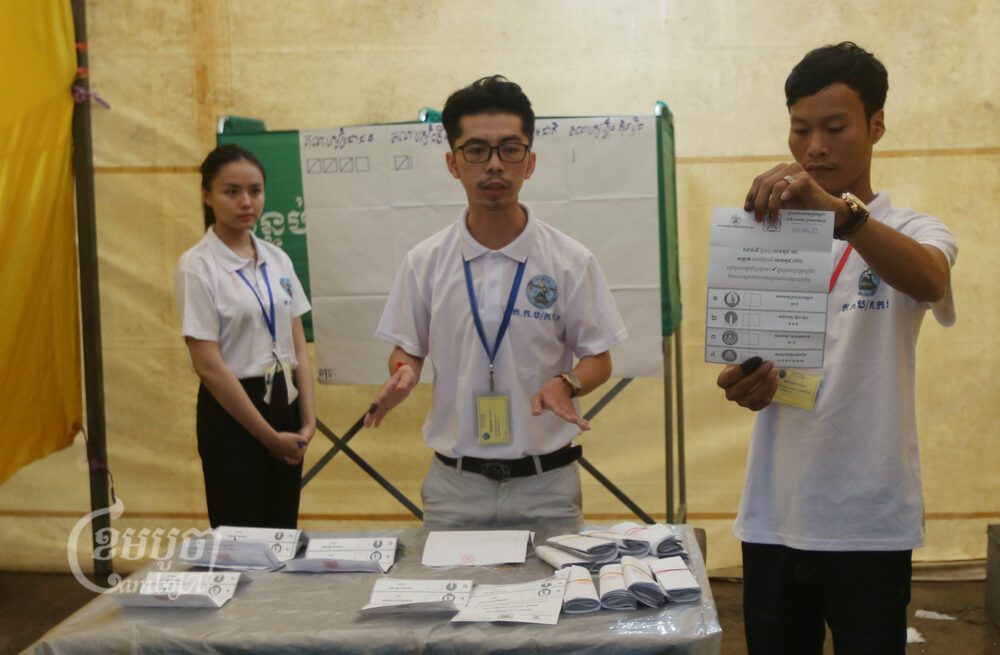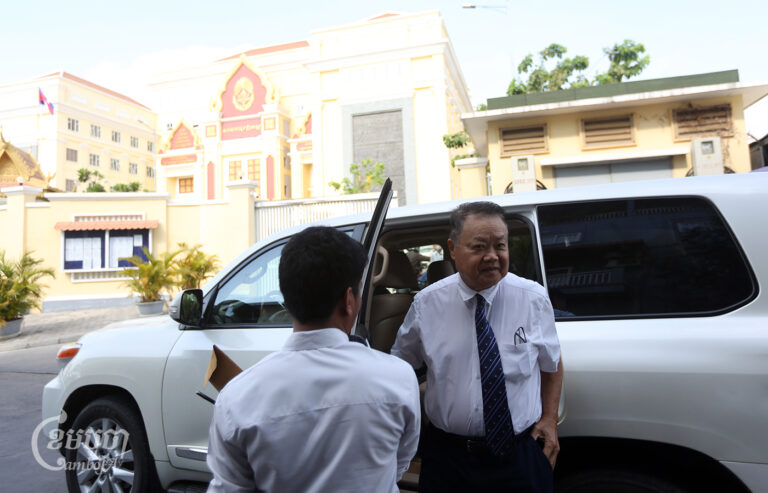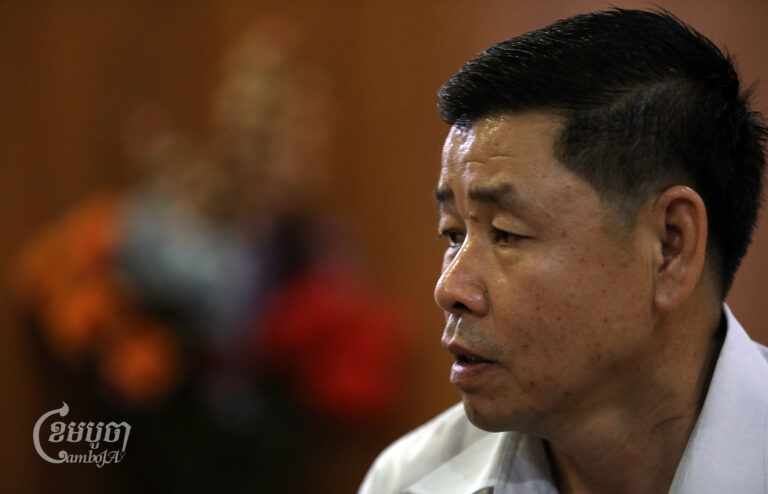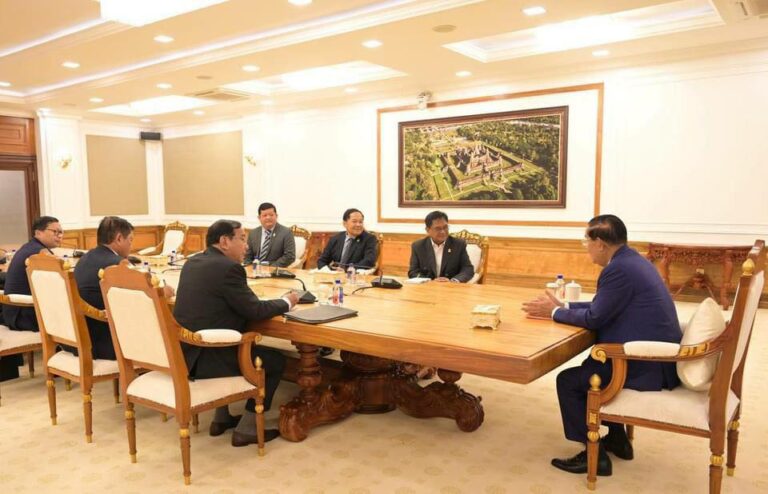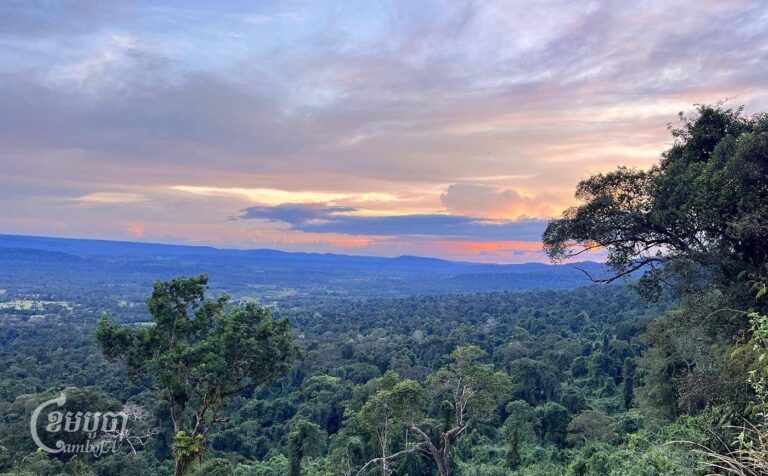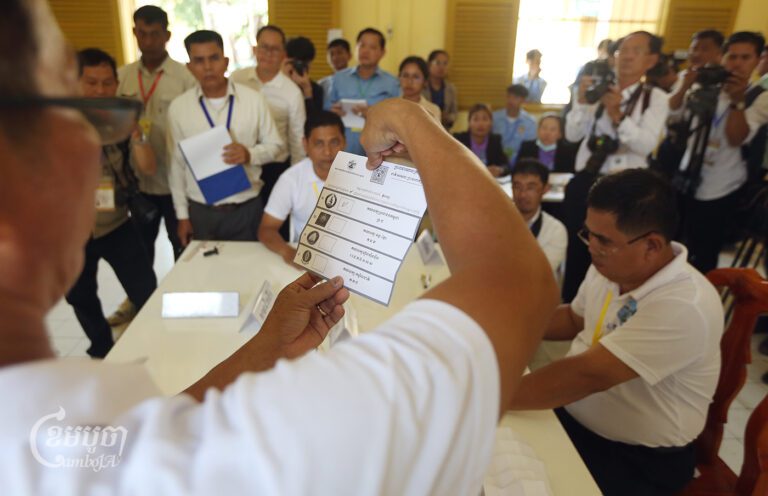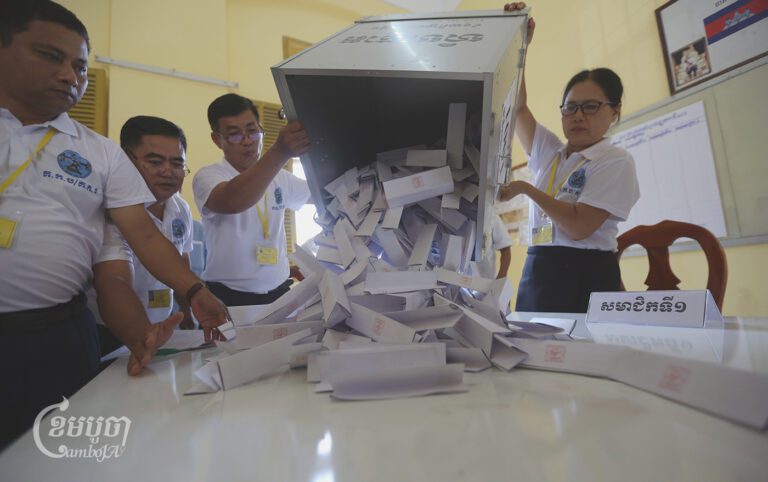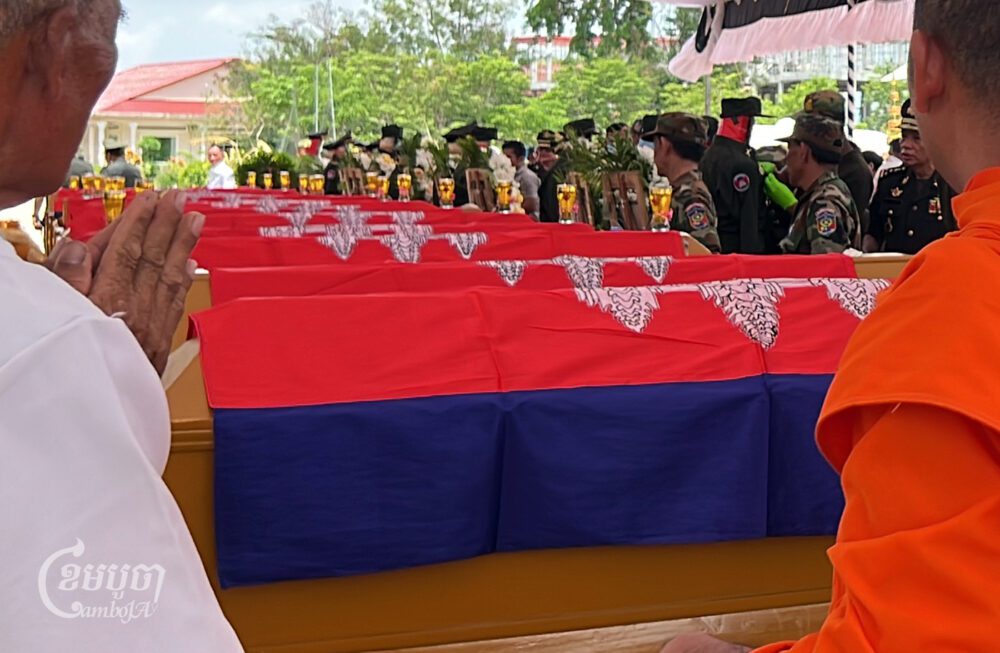A systemic analysis of 2022 commune election ballot forms from Phnom Penh’s polling stations reveals “significant irregularities” in vote tallying, suggesting “election fraud and vote tampering,” according to a report released Monday by Human Rights Watch (HRW).
The NGO warned these issues could foreshadow further problems in vote tallying for the July 23 national elections as political campaigns officially kicked off on Saturday.
The HRW report found consistent cases of missing ballots, unexplained added votes, numerous corrections and erasures, and nearly half of Phnom Penh’s more than 2,000 polling stations were overseen solely by representatives of the ruling Cambodian People’s Party (CPP).
HRW noted it was unclear whether ballots had been “purposefully manipulated” but expressed concern that the issues found in polling station forms did not appear to have been corrected.
“The National Election Committee (NEC) should be humble enough to admit that, at a minimum, they made major mistakes,” Phil Robertson, the deputy Asia director for HRW, commented. “They owe it to the Cambodian people to explain what went wrong, what was learned from the failures in June 2022, and how the NEC will ensure those mistakes are not repeated three weeks from now in the national election.”
Local officials responsible for submitting polling station results identified by HRW as incorrect denied there was any wrongdoing. NEC spokesperson Hang Puthea claimed that the Human Rights Watch report was an attempt to sabotage the forthcoming national elections.
“I think that this report has the intention to prevent voting in Cambodia, why have they published at this time, while we are carrying out the electoral process,” Puthea said. “I would like to verify that not all elections were perfect, there were some irregularities from one election to another, but that does not affect election results.”
HRW’s Robertson said the report focused on Phnom Penh’s polling stations because of significant disparities in election results.
In the 2017 commune elections, the ruling CPP won in 690 of Phnom Penh’s 2,080 polling stations or 33%, while in last year’s elections the CPP claimed victory in 99.9% of polling places — losing in only one of 2,155 polling stations, according to the report.
In last year’s commune elections, the CPP claimed more than 74% of the popular vote to the leading opposition Candlelight Party’s 22.25%.
HRW’s analysis was based on a review of all Phnom Penh polling station’s 1102 forms — which are used by officials to register each polling station’s results and publicly available through the NEC’s website — showed 19% had vote counts that did not add up with the actual ballots cast.
There were also unexplained corrections, erasing the initially entered figures and in one case an entire party, in 15% of the forms, Human Rights Watch found.
In 3.5% of polling stations, officials submitted forms completely omitting required vote statistics and 3% did not record the names of parties.
The HRW report included 10 examples of problematic 1102 reports. Out of the 10 forms shown in the report, a total of 131 extra ballots were cast and 332 ballots were missing.
HRW did not report the total number of ballots added and or missing from polling station forms across Phnom Penh.
In one ballot highlighted by HRW, the form submitted by officials at Phnom Penh’s Tuol Svay Prey I Commune was missing 55 ballots as calculated from the amount of ballots provided, the amount left over and the total number of votes reported. No vote totals are properly recorded and party names are omitted, while observers vaguely list themselves as affiliated with a “political party,” HRW states.
Sok Vy of the Tuol Svay Prey I commune election committee told CamboJA: “I correctly filled in figure [1102], and if you want to know clearly, please ask PEC (Phnom Penh Municipal Election Committee) and NEC.” He declined to comment further.
PEC director Sim Dony declined to comment, saying he was busy in a meeting.
Long Phal from the Chaom Chao II commune election committee — where two CPP officials allegedly counted an extra 45 ballots according to the form they submitted — believes the report from HRW is not accurate.
CamboJA attempted to obtain comment from other commune election committee (CEC) polling stations mentioned in the report including Wat Phnom and Srah Chak, but officials could not be reached.
CPP spokesperson Sok Eysan rejected the report and any notion of voting tally “irregularities”, claiming commune elections in Cambodia were carried out smoothly in the interests of upholding multi-party democracy.
“[HRW] is an irregularity itself because what it has written isn’t true, how do they clearly know the figure because they do not live here,” Eysan said. “As we have known, that organization is an opposition opponent.”
HRW’s Robertson denied that the NGO had taken a partisan stance.
“The NEC’s knee-jerk reaction to label us as some part of the opposition is an effort to smear us because they don’t have anything else to say,” Robertson said. “The NEC posted the 1102 forms online, so anyone anywhere could have gotten them if they knew where to look.”
In December of last year, opposition Candlelight Party co-vice president Son Chhay was found guilty of defamation and ordered to pay the CPP a fine of 4 billion riel ($1 million) for alleging voting irregularities and electoral fraud in the 2022 communal elections.
Sam Kuntgeamy of Neutral and Impartial Committee for Free and Fair Election in Cambodia (NICFEC) told CamboJA he had not seen the HRW report and declined to comment about the 2022 commune elections.
Funcinpec spokesperson Nhoeurn Raden said he did not want to comment because his party had “no problem” with the polling station forms.
Grassroots Democratic Party spokesperson Sek Sokha, declined to comment and referred question party president Yeng Virak, who could not be reached for comments.
Kim Chhorn of the Committee for Free and Fair Election in Cambodia (Comfrel) declined to comment on the HRW report. He said his organization had not done its own assessment of the 1102 forms but was concerned about the upcoming national elections.
The Candlelight Party was disqualified from participating in the elections in May, while the following month the National Assembly passed amendments to electoral laws which would block candidates from running in future elections if they did not vote in July.
“We do not see any improvement on the key points linked to a free and fair election,” Comfrel’s Chhorn said. “You can see there is no competitive election, but we will focus on the election counting process on polling day.”


